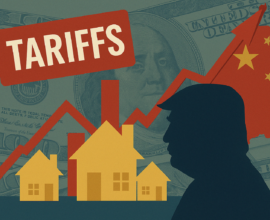How Will the 2024 Election Affect Real Estate Investors?
On 5 November 2024, American voters will cast their ballots for who they want to be the next U.S. president, and the winning candidate will take office the following January.
Current polls show the final match-up will be between current President Biden and former President Trump. The election result could have a major impact on the real estate market, so investors would do well to follow the election closely.
In this article, we’ll go over some of the historical, economic, and policy factors at stake, so you can know what to expect next November and make more informed investing decisions along the way. Let’s get started!
Depending on your political beliefs, the next president could help or hurt the economy.
Presidential election years dampen property sales, appreciation
Historically, home sales have slowed down in election years. This is because the prospect of a new president tends to create uncertainty about the future economy, and homebuyers become more cautious as a result.
“Why [presidential elections] affect the market more than any other elections is simply because people fear change,” Matt Laricy, managing broker of The Matt Laricy Group in Chicago, told Forbes. “Whenever people get nervous, they don’t make rational decisions. They make emotional decisions.”
The tighter the presidential race, the higher the anxiety among buyers. For example, the contest between Biden and Trump is relatively close at the moment. If it remains so, we can expect home sales to dip, especially in the months right before November. However, if a single candidate emerges as the probable winner, there may be less noticeable change in real estate transactions, leading to “business as usual.”
As it stands, consumer confidence metrics show Americans are increasingly skeptical about our economic future (and real estate by extension).
Of course, buyers don’t duck out of the real estate game forever. Typically, they just defer buying a home until after the election, when they know who will be directing the country’s economy for the next four years. Consequently, it’s common to see a sudden spike in home sales immediately after the election from all the pent-up demand.
Keep in mind that a drop in property sales may also have an impact on the appreciation of real estate you already own. A study by Movoto, for example, shows that, on average, your house will appreciate by 4.5% in an election year compared to 6% the year before and 5.3% the year after.
It’s no secret that the current real estate market is in crisis.
Presidents’ impact on economic growth, inflation risk, and interest rates
Another way the upcoming 2024 election could impact real estate is the candidates’ proposed economic policies. For example, Republicans tend to favor lower taxes, deregulation, fiscal conservatism, and free trade, while Democrats tend to favor progressive taxation, regulation, social safety nets, and increased labor rights.
Depending on your political beliefs, the next president could help or hurt the economy. Economic growth could boost Americans’ financial situations and thereby increase housing demand and prices. However, it could also lead to higher inflation, pressuring the Federal Reserve to raise interest rates to curb it (as it has done over the past year and a half).
The Federal Reserve is an independent U.S. government entity that sets the Federal Funds Rate, the benchmark for all other interest rates, including mortgage rates. Recently, the Fed indicated that a few more rate hikes could be ahead, followed by a sustained period of higher interest levels. If mortgage rates continue rising, the cost of housing will also increase, dampening buyer demand.
Other economic policies that could impact housing demand include student loan forgiveness and foreign wars and sanctions. For example, Biden has canceled $127 billion in student debt for nearly 3.6 million people despite the Supreme Court blocking his controversial student loan forgiveness program. If this continues, it will increase the discretionary spending power of those forgiven, pumping more money into the economy and putting upward pressure on inflation.
Similarly, the recent Israel-Hamas war threatens to disrupt the oil market. Since the U.S. depends heavily on foreign oil, this could have widespread implications for the country’s economy, including real estate. If, for example, oil supply drops and prices go up, Americans will have less money to spend on other goods, which could trigger an economic downturn.
Of course, the state of the economy doesn’t rest solely on the president, but voters still look to the president to address their economic concerns and drive growth.
Housing policy on track to becoming a key voting issue
It’s no secret that the current real estate market is in crisis. Housing affordability is the worst it’s been since 1985, and the average 30-year fixed mortgage rate hit 8% for the first time since 2000. Needless to say, the housing market is on many voters’ minds and will be a hot voting issue come November 2024. Presidential candidates will need to win over Americans with their proposed housing solutions.
President Biden has already introduced a Housing Supply Action Plan, which aims to:
- Reduce barriers to building housing (like restrictive and costly land use and zoning rules).
- Expand financing for affordable, energy-efficient, and resilient housing.
- Promote commercial-to-residential conversion opportunities, particularly for affordable and zero-emissions housing.
If Biden is elected in 2024 and his housing proposals continue to be enacted, housing supply and demand among lower-income buyers may increase. Other presidential candidates, including Trump, may run on different housing policy platforms.
One area to keep an eye on is real estate tax breaks. Though presidents don’t directly set tax laws, they can steer the tax policy agenda and work with Congress to advance their administration’s tax priorities. So, depending on who wins the election, your investment properties may be taxed differently, which could amount to a lot of money.
According to recent polling, Biden’s economic approval rating sits at 37%, with 59% of respondents expressing disapproval of his performance. In contrast, Republicans hold a 21-point advantage over Democrats on the economy (49%-28%), the largest lead Republicans have held in 32 years.
To win the 2024 election, Biden will need to prove to voters that he can achieve better economic results than Trump or any other candidate can. Of course, the state of the economy doesn’t rest solely on the president, but voters still look to the president to address their economic concerns and drive growth.
At the end of the day, nobody knows how the 2024 election will pan out or what the impact on real estate investors will be. But now that you know some of the factors at play, you’re better prepared to read and adapt to market signals as election day nears.








